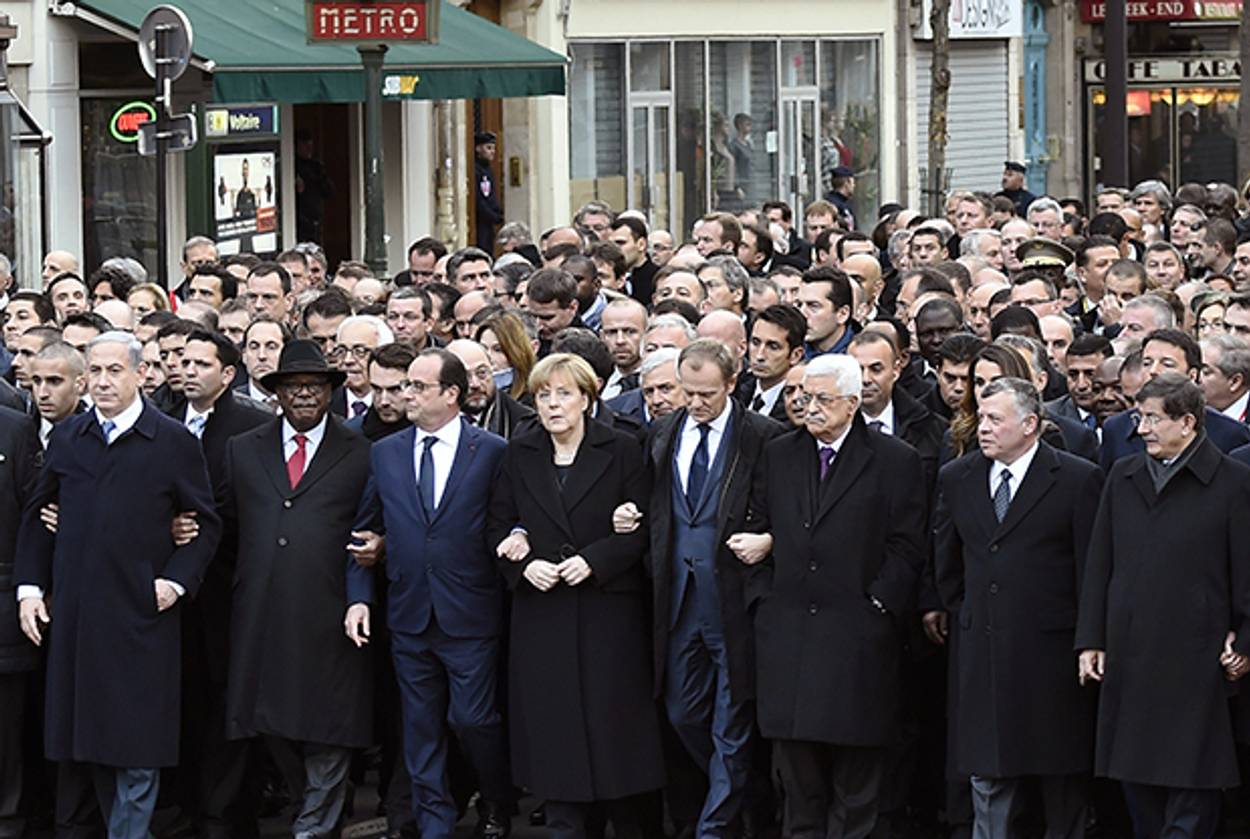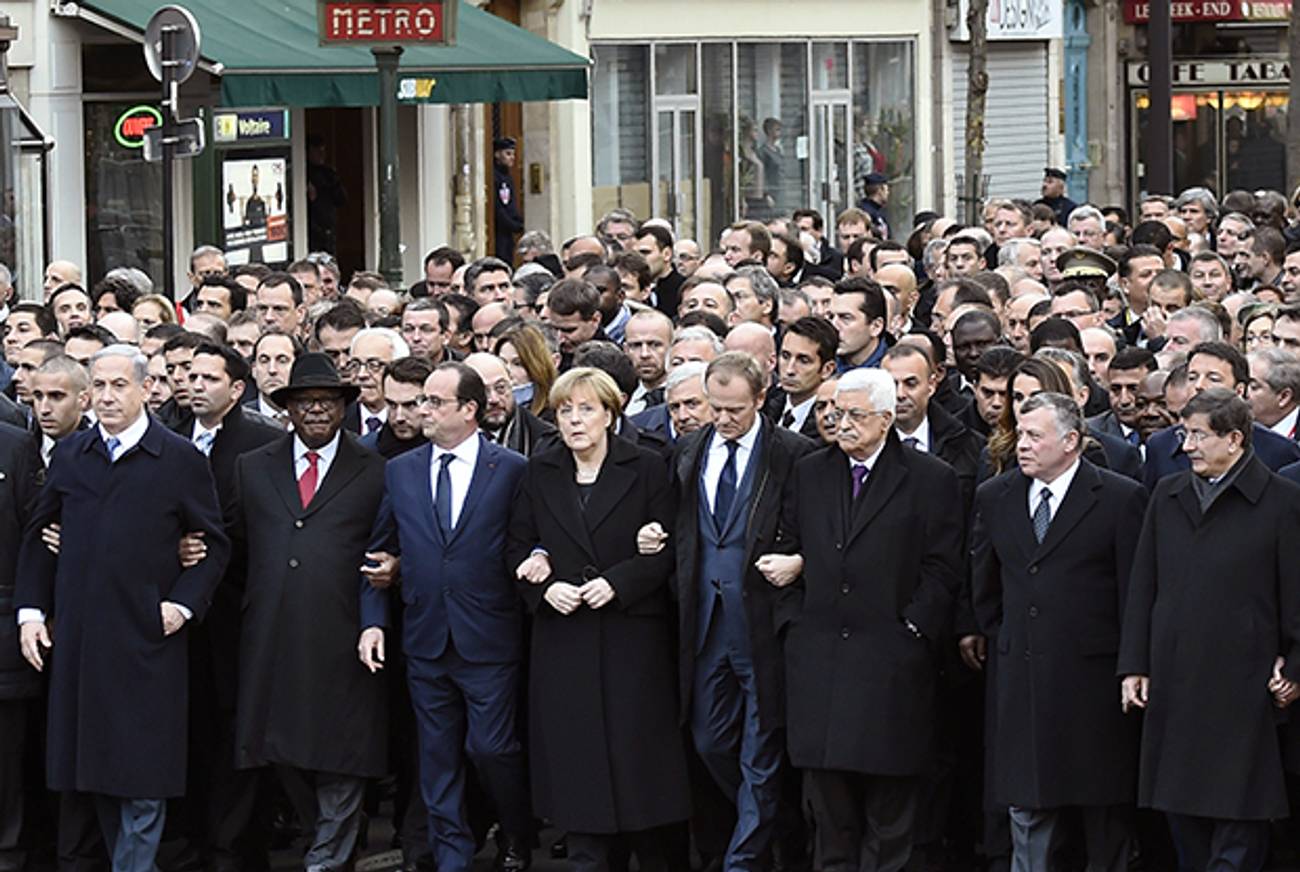Paris’ March of Folly
Inclusion of leaders like Abbas and Turkey’s Davutoglu turned a symbolic moment into a farce




This Sunday, a gaggle of world leaders rushed to France to march along with hundreds of thousands of Parisians to commemorate the murders of 17 civilians by Islamic terrorists last week. It was, according to reports, the largest public gathering the city has seen since booting out Hitler and his gang in 1945, an inspired moment of global communion proving that our species could yet prove capable to come together in peace.
Scratch that. The rally was a sham, mired by the presence of invited guests who represent precisely the kind of behavior the marchers purported to protest.
Just slightly to the left of Francois Hollande, for example, strode Mahmoud Abbas. If the rally in Paris was organized to decry the killing of Jews and the violent silencing of journalists, Abbas’s inclusion is a farce. As the President of the Palestinian Authority, he’s presided over a fiercely restrictive regime, arresting journalists for covering his Fatah movement unfavorably and engaging in other censorious behaviors that had won his government the dismal mark of 83 out of 100 on Freedom House’s Press Freedom score, 100 being the worst. Late last year, when an armed gunman did in Jerusalem exactly what men sharing his convictions did in Paris last week, shooting an Israeli rabbi for expressing controversial opinions, Abbas sent a letter of condolence to the man’s family after the terrorist was apprehended and killed by Israeli security forces. The shooter, Abbas waxed poetic, was a martyr whose death will be added to the crimes of the Israeli occupation.
A few rows back, Turkey’s Prime Minister, Ahmet Davutoglu, ambled as well, celebrating, perhaps, the fact that, in 2013, his country had more journalists behind bars than any other nation in the world. Things got worse in 2014: according to Freedom House, harassment and intimidation of journalists are common in Turkey, as is censorship. It’s unlikely that any of this occurred to Davutoglu as he took in Paris’s charms. It’s also unlikely that he’d given any thought to the fact that his government, to an unknown extent, supports the very same murderous organization to which at least one of the Paris terrorists had pledged his allegiance.
Shall we praise other famous marchers? Lavrov of Russia, where offing offensive journalists is nothing out of the ordinary (see under Politkovskaya, Anna)? Sheikh Khaled bin Ahmed Al Khalifa, the foreign minister of Bahrain, which has sentenced an award-winning photojournalist to a 10-year sentence on what, according to the Committee to Protect Journalists, are trumped-up charges? Sheikh Mohamed Ben Hamad Ben Khalifa Al Thani, another funder of terrorism and champion of repression?
That these men marched in Paris—while Israel’s prime minister, alone among world leaders, was asked by the French president to sit the march out—is more than just the casual hypocrisy that is an inevitable part of global diplomacy. It’s an indication that in our zeal to appear united, we’ve forgotten the cardinal rule of standing on principle, namely that we must first clearly define our boundaries and then invite only those who share our convictions to join us. Otherwise, our beliefs are no deeper than a hashtag, and every bit as ephemeral.
Liel Leibovitz is editor-at-large for Tablet Magazine and a host of its weekly culture podcast Unorthodox and daily Talmud podcast Take One. He is the editor of Zionism: The Tablet Guide.